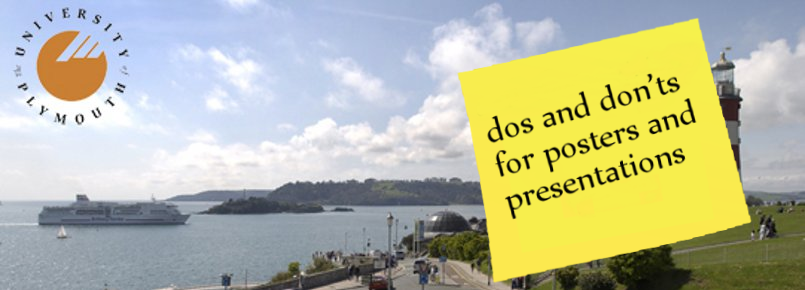Some dos and don’ts for posters and presentations

There are two prizes to be won at the UK Oceanography Challenger Conference, in addition to that for the best entry to the President’s Photographic Competition. These prizes honour Cath Allen and Norman Heaps. Cath Allen was a researcher in fluid dynamics at the University of Lancaster, who died in 1991. The Challenger Society introduced the prize to combat the idea that contributing to a conference poster session is a second best alternative to delivering a paper, even though a poster needs to be at least as well thought-out as a talk. Norman Heaps was a shelf-sea modeller who died in 1986. He was a particularly clear speaker, with an enthusiastic, lively and entertaining way of delivering a talk.
The Cath Allen Poster Prize
• A poster is a chance to use your skill in presentation of data, in layout, and in distilling the essence of your message. It is not an abbreviated paper.
• A poster needs to be attractive, with an interesting title that is visible from a distance. If a poster doesn’t draw attention to itself, it could be overlooked, and all the work put into it could be wasted.
• A poster needs to be easily readable, and not just by someone standing really close to it. For the main text, take care to choose a clear type-face at sensible point size. Avoid long complex sentences.
• Avoid large slabs of text and overlong line-lengths; the optimal line-length for readability is considered to be 50–65 characters per line, including spaces. For consistent spacing between words, use unjustified text.
• Ensure your diagrams are large enough to be seen clearly, and that the line weights of graphs etc. aren’t too spindly.
• Ensure that you have explained your symbols and acronyms, and have put scales on figures if necessary.
• Try not to have more than about five figures (diagrams and photos). Remember that a well-chosen picture can be worth a thousand words.
• Diagrams need to be close to the text that relates to them, or very easily found.
• Make use of colour to enliven the poster and help direct the reader where to look.
• Don’t be tempted into over-complicating the appearance of the poster, and obscuring your message.
• Try to convey why your research is so exciting.
• Be there by your poster to answer questions.
The Norman Heaps Prize
• Time your talk beforehand. There is nothing more upsetting than having to leave the podium without getting to your conclusion.
• Beware of overload. It’s not advisable to have more than about half-a-dozen pieces of ‘hard’ information (diagrams, maps, tables) per 15 mins of presentation. That’s still only 2.5. minutes per picture. (This doesn’t preclude any scene-setting photos.)
• Don’t forget that your time slot includes 2–3 minutes for questions.
• Everyone uses their Powerpoint slides as memory prompts, but try not to find yourself just reading from them or you will lose spontaneity.
• In particular, reading through introductory slides that show the title, the aims, methods, results and even conclusions, takes up valuable time and isn’t necessary, as the Chair will have already introduced you, and the audience has the book of abstracts. If you are determined to have an introductory slide, make it brief and interesting.
• Your results may be fascinating, but that’s irrelevant if they can’t be read from further back than the first two rows. Graphs and diagrams are easier for an audience to take in than tables. If you do use tables, highlight the numbers you are talking about.
• Make use of colour to enliven your graphics and help convey your storyline.
• Use variety – switch between text, diagrams and photos. If you use visuals from a number of sources, ensure that they use the same conventions for symbols etc.
• Remember who your audience are. Challenger conferences are attended by marine scientists from all disciplines, each with their own vocabulary, so try to explain any specialist terms so that everyone can follow your talk.
• Try to convey why your research is so exciting.
Latest News
Royal Society Publishing Photography Competition 2025
Please see a message from the Royal Society below:
We are delighted to announce that the 2025 Competition is now open for entries until 15 August for a chance to win £1000! The competition celebrates the power of photography in conveying the wonder of science happening all around us and photographs can be submitted in the categories of: Astronomy, Behaviour, Earth Science and Climatology, Ecology and Environmental Science, and Microimaging.
The competition is free to enter and open to anyone studying or working in science at graduate level or above. Category winners will receive a one-year membership to the Royal Photographic Society and the overall winner will receive a grand prize of £1,000. Find out more: https://bit.ly/RSPphotocomp
October 2025 MEDIN Workshop: Marine Data Management, Governance and the MEDIN toolset
The Marine Environmental Data and Information Network (MEDIN) are pleased to announce that registration is now open for the next occurrence of our popular free online training workshop: ‘Marine Data Management, Governance and the MEDIN toolset’ on the 13th – 17th October 2025 on OceanTeacher Global Academy.
Marine Data Management, Governance and the MEDIN toolset
The Marine Environmental Data and Information Network (MEDIN) and OceanWise are delighted to invite you to attend our popular free online training workshop: ‘Marine Data Management, Governance and the MEDIN toolset’ on the 19th – 23rd of May 2025.
